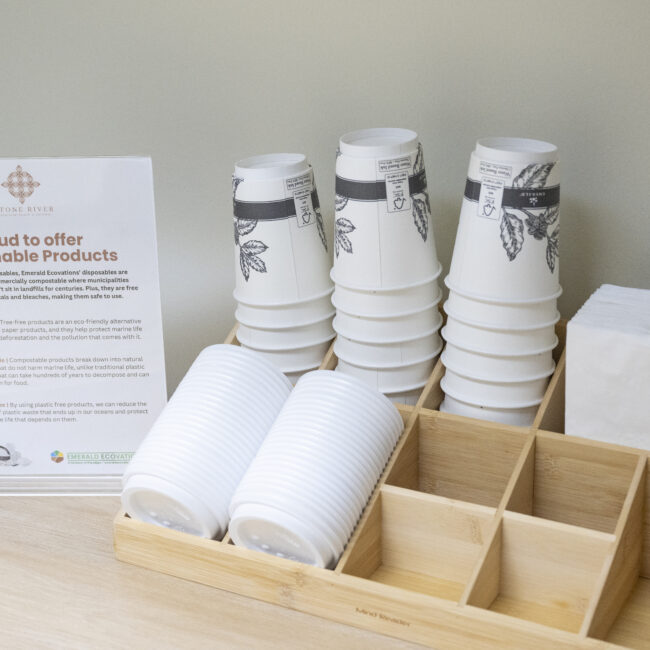-
DBT Treatment Center in New Jersey
Dialectical Behavioral Therap
- Stone River Behavioral Health
- What We Treat
- Dialectical Behavioral Therapy
If you or a loved on is in need of treatment for dialectical behavioral therapy in New Jersey, look no further than Stone River Behavioral Health.
dbt Treatment in NJ
Dialectical Behavioral Therapy (DBT) Services in NJ at Stone River Behavioral Health
At Stone River Behavioral Health, located in Holmdel, NJ, we recognize that mental health challenges are deeply personal and complex. Mental health struggles can significantly affect your life, from everyday functioning to your relationships with others. Whether it’s anxiety, depression, or emotional instability, mental health disorders can leave individuals feeling overwhelmed. However, when mental health struggles are paired with substance use or addiction, it can create an even more complex scenario. This combination, known as dual diagnosis, often involves a person experiencing both a mental health disorder and a substance use disorder simultaneously. Dual diagnosis requires a comprehensive, multi-faceted approach for effective treatment and long-term recovery.
At Stone River Behavioral Health, we are committed to providing holistic care that addresses both mental health and substance use disorders. Our experienced, compassionate professionals specialize in Dialectical Behavioral Therapy (DBT), an evidence-based treatment known for its success in helping individuals navigate the complexities of dual diagnosis issues. Our DBT therapy programs in NJ are designed to foster healing, build emotional resilience, and promote healthy coping mechanisms so individuals can regain control over their lives and work toward lasting recovery.
- What Does Dialectical Behavioral Therapy Look Like?
What is Dialectical Behavioral Therapy (DBT)?
Dialectical Behavioral Therapy (DBT) is a form of cognitive-behavioral therapy (CBT) that was originally developed by Dr. Marsha Linehan in the late 1980s to treat individuals with borderline personality disorder (BPD). Since its inception, DBT has evolved to help individuals manage various mental health conditions, including anxiety, depression, substance use disorders, and other emotional challenges.
The foundation of DBT is the idea of dialectics, which refers to the balancing of opposites. In DBT, this concept is used to help individuals accept their current state while simultaneously working toward positive change. Essentially, DBT encourages the acceptance of one’s emotions, thoughts, and behaviors while promoting strategies to improve overall emotional regulation and interpersonal effectiveness.
Core Components of DBT
DBT is a multifaceted therapeutic approach that incorporates both individual therapy and group skills training. The therapy is typically delivered in a structured manner with distinct goals and components:
Mindfulness is central to DBT. It involves learning to focus on the present moment with non-judgmental awareness. Mindfulness helps individuals become more attuned to their thoughts, emotions, and physical sensations, allowing them to identify patterns of behavior and emotional responses. It fosters a sense of self-awareness and helps individuals manage overwhelming feelings.
Distress tolerance skills are designed to help individuals tolerate and navigate painful situations without resorting to self-destructive behaviors, such as substance use or self-harm. These skills help individuals stay grounded in the moment and find healthier ways to cope with stress and crises.
For those struggling with intense emotions, DBT helps individuals regulate their emotional responses. Emotion regulation skills teach individuals how to recognize, understand, and manage their emotions effectively. By identifying emotional triggers and using coping strategies, individuals can learn to maintain emotional stability and reduce emotional reactivity.
This component teaches individuals how to build healthier, more effective relationships. DBT helps clients develop communication skills, assertiveness, and problem-solving strategies that improve interactions with others. Strong interpersonal relationships are vital for mental health and long-term recovery, and DBT provides practical tools to help individuals manage conflicts and build positive connections.
DBT therapy typically involves a combination of individual sessions with a trained therapist and group therapy sessions focused on skill-building. The individual therapy sessions allow clients to address personal struggles and work on specific goals, while the group sessions offer a supportive environment to practice new skills alongside others who share similar experiences.
- What We Offer
Our Treatment Services
- 100% Confidential Support
Request a Confidential Callback
- Treating DBT at Stone River Behavioral Health
The Benefits of New Jersey DBT Therapy Programs
Dialectical Behavioral Therapy offers a wide range of benefits, particularly for individuals dealing with complex mental health issues and dual diagnosis conditions. The multifaceted nature of DBT provides clients with the tools and strategies needed to manage their emotions, navigate interpersonal relationships, and handle stress in healthy, constructive ways.
Comprehensive Coping Strategies
DBT provides individuals with a toolkit of coping strategies to manage both immediate crises and long-term emotional challenges. These strategies help individuals navigate difficult situations without resorting to harmful behaviors such as substance abuse or self-harm. DBT equips individuals with the skills they need to respond to life’s challenges in a healthy, proactive manner. The comprehensive approach helps individuals feel empowered to take control of their emotional responses and behaviors, even in high-stress situations.
Enhanced Emotional Regulation
Individuals with mental health disorders, especially those experiencing dual diagnosis, often struggle with intense emotions. These emotional dysregulations can lead to impulsive behaviors or difficulty managing stress, making it harder to cope with daily life. DBT helps individuals identify emotional triggers and understand the root causes of their intense feelings. With the skills learned through DBT, individuals can regulate their emotions more effectively, reducing the frequency and intensity of emotional outbursts. This emotional stability enhances overall well-being and fosters a sense of self-control.
Improved Interpersonal Relationships
Interpersonal relationships often play a central role in both mental health struggles and substance use disorders. Many individuals with dual diagnoses face challenges in maintaining healthy, fulfilling relationships due to difficulty with emotional regulation, communication, and conflict resolution. DBT’s focus on interpersonal effectiveness teaches individuals how to communicate clearly, assert their needs, and establish boundaries. These skills enhance relationships with family, friends, and colleagues, promoting healthier social interactions and creating a stronger support network for recovery.
Increased Distress Tolerance
Life is full of stressful situations, and distress tolerance skills are vital for managing difficult emotions without resorting to self-destructive behaviors. DBT teaches individuals how to tolerate intense emotional experiences and manage crises in a healthier way. These skills include learning techniques such as grounding exercises, self-soothing strategies, and distraction methods to help individuals stay composed during distressing situations. This increase in distress tolerance promotes emotional resilience and reduces the likelihood of relapse into negative coping behaviors, such as substance use or self-harm.
Self-Discovery and Personal Growth
Mindfulness practices in DBT encourage self-reflection and self-awareness. By becoming more mindful of thoughts, emotions, and behaviors, individuals can develop a deeper understanding of themselves. This process fosters self-acceptance, encourages personal growth, and enhances overall well-being. With DBT’s focus on emotional regulation and interpersonal skills, individuals are empowered to make lasting positive changes in their lives.
Evidence-Based Success
DBT is backed by extensive research and clinical studies that have demonstrated its effectiveness in treating various mental health conditions and dual diagnosis issues. The structured nature of DBT, combined with its emphasis on skill-building and emotional regulation, has been proven to reduce symptoms of mental health disorders and improve overall functioning. For individuals struggling with substance use and co-occurring mental health issues, DBT offers a reliable, research-supported treatment option for long-term recovery.
Holistic Healing
At Stone River Behavioral Health, we take a holistic approach to treatment. We believe that true healing encompasses the mind, body, and spirit. DBT aligns with our commitment to addressing the whole person and providing care that promotes overall well-being. In addition to DBT, we integrate other therapeutic modalities to support your journey to recovery. This comprehensive approach helps ensure that you are receiving the most effective care possible and fosters long-term success in recovery.
- Stories of Healing
Client Testimonials

Sarah M.
"Seeking mental health support was a huge step for me, and Stone River Behavioral Health made the journey less daunting. Their approach to treatment is personalized, and they took the time to understand my unique struggle with anxiety. I can confidently say my quality of life has improved immensely since starting with them."

David G.
"I was battling severe depression when I first walked into Stone River Behavioral Health — they literally saved my life. The team was incredibly supportive from day one, providing me with the tools and strategies to navigate through my darkest moments. Today, I'm able to lead a life that once seemed unattainable. Thank you, Stone River!""

Lisa T.
"Stone River Behavioral Health has been an absolute game-changer for our family. Their compassionate and skilled team helped my son manage his schizophrenia symptoms effectively, giving him hope and us peace of mind. They didn't only treat him but also involved us in the process to better understand and support him. We're forever grateful."

Rebecca F.
"I've struggled with PTSD for years, but the team at Stone River Behavioral Health has made a difference like no other. Their trauma-based therapies and supportive environment have helped me reclaim my life from the shadows of traumatic experiences. It's not just about managing symptoms, it's about healing. At Stone River, I felt heard, cared for, and, most importantly, hopeful. Highly recommended!"
Depression
Characterized by persistent feelings of sadness, hopelessness, and a lack of interest in activities once enjoyed. Depression can affect one’s daily life and require interventions like therapy and medication.
Anixety Disorders
These include generalized anxiety disorder, panic disorder, and social anxiety disorder. Individuals may experience excessive worry, panic attacks, and intense discomfort in social situations.
Bipolar Disorder
Marked by extreme mood swings that include emotional highs (mania or hypomania) and lows (depression).
Trauma & PTSD
Develops after experiencing or witnessing a traumatic event. PTSD can cause severe anxiety, flashbacks, and uncontrollable thoughts about the event.
Obsessive-Compulsive
Involves unwanted, intrusive thoughts (obsessions) and repetitive behaviors (compulsions) that individuals feel driven to perform.
Substance Use
Chronic use of substances like drugs and alcohol that leads to significant impairment and distress. This includes those with co-occurring, dual-diagnosis substance use and mental health conditions.
- Start Your Journey Now
Take the First Step Toward Healing
If you or a loved one are struggling with mental health or dual diagnosis issues in New Jersey, we encourage you to take the first step toward healing by reaching out to Stone River Behavioral Health. Our team of dedicated professionals is here to provide you with compassionate, individualized care tailored to your unique needs. Through our Dialectical Behavioral Therapy programs, we can help you regain control of your emotional well-being and work toward lasting recovery.
Contact Us Today
Don’t wait to take the next step in your healing journey. Contact us today to speak with one of our admissions team members and learn more about our DBT therapy programs. We are here to guide you through the process and provide the support you need to make lasting, positive changes in your life.


























